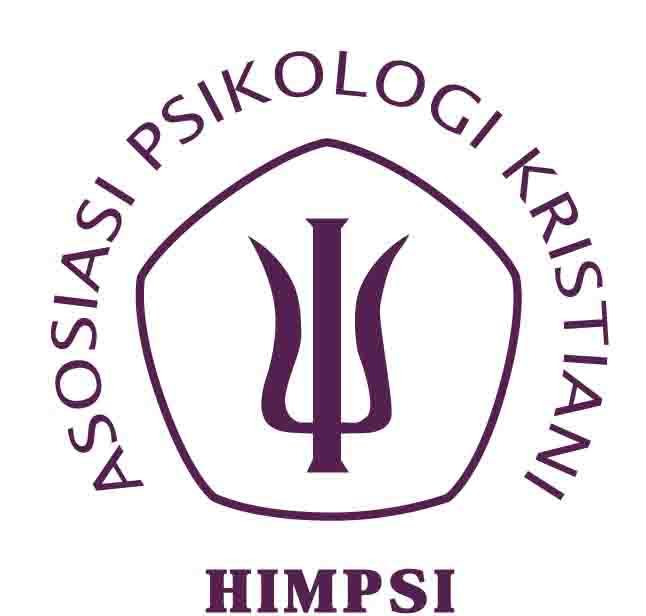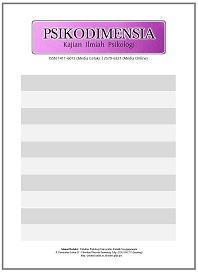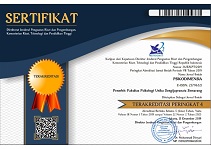Gambaran Motivasi Mengajar Guru Tingkat Sekolah Menengah Pertama (SMP) pada Masa Pandemi Covid-19
Abstract
Abstrak: Pandemi Covid-19 memberikan dampak terhadap perubahan sistem pembelajaran menjadi dalam jaringan (daring) atau Pembelajaran Jarak Jauh (PJJ), sehingga menimbulkan tantangan baru bagi guru. Untuk menghadapi tantangan tersebut, motivasi mengajar dibutuhkan oleh sebagai tenaga pendidik. Penelitian ini bertujuan untuk memberikan gambaran motivasi mengajar guru SMP pada masa pandemi Covid-19. Jenis penelitian ini adalah kuantitatif deskriptif. Teknik pengambilan data yang digunakan adalah nonprobability-criterion sampling dan snowball sampling. Partisipan yang terlibat sebanyak 136 guru SMP di Jakarta. Analisis data yang dipaparkan berupa statistic deskriptif dan uji analisis menggunakan Independent-Sample T-Test, dan Mann-Whitney U. Hasil penelitian menunjukkan bahwa motivasi mengajar guru SMP di masa pandemi Covid-19 cenderung tinggi, namun masih terdapat sebesar 34.6% guru SMP yang tidak termotivasi untuk mengajar di masa pandemi Covid-19. Penelitian ini juga menemukan terdapat perbedaan regulasi motivasi mengajar pada guru SMP ditinjau dari tahap usia, pendapatan, serta jenis sekolah tempat guru mengajar. Dengan demikian, dapat disimpulkan bahwa guru tingkat Sekolah Menengah Pertama termotivasi untuk mengajar selama masa pandemi Covid-19.
Kata kunci: Motivasi mengajar, guru, Covid-19
Abstract: The Covid-19 pandemic has brought an impact on changing the learning system into a network (online) or distance learning, causing new challenges for teachers. To face these challenges, teaching motivation is needed by teachers as educators. This study aimed to provide an overview of the teaching motivation of junior high school teachers during the Covid-19 pandemic. The research type was descriptive quantitative. The data collection techniques used were nonprobability-criterion sampling and snowball sampling. Participants involved in this study were 136 junior high school teachers in Jakarta. Descriptive Statistics were used in this study and analysis using Independent-Sample T-Test, and Mann-Whitney U were also used. The results of this study indicated that the teaching motivation of junior high school teachers during the Covid-19 pandemic tends to be high, but there are still 34.6% of junior high school teachers who are not motivated to teach during the Covid-19 pandemic. This study also found that there were differences in teaching motivation regulations for junior high school teachers in terms of age, income, and the type of school where the teacher taught. Thus, it can be concluded that teachers in Junior High School are motivated to teach during the Covid-19 pandemic.
Keywords: Teaching motivation, teacher, Covid-19.Keywords
Full Text:
PDFReferences
Abós, Á., Haerens, L., Sevil, J., Aelterman, N., & García-González, L. (2018a). Teachers motivation in relation to their psychological functioning and interpersonal style: A variable and person-centered approach. Teaching and Teacher Education, 74(1), 21–34. https://doi.org/10.1016/ j.tate.2018.04.010
Abós, Á., Sevil, J., Martín-Albo, J., Aibar, A., & García-González, L. (2018b). Validation evidence of the motivation for teaching scale in secondary education. Spanish Journal of Psychology, 21(9), 1–12. https://doi.org/10.1017/sjp.2018.11
Ayuni, D., Marini, T., Fauziddin, M., & Pahrul, Y. (2021). Kesiapan guru TK menghadapi pembelajaran daring masa pandemi Covid-19. Jurnal Obsesi: Jurnal Pendidikan Anak Usia Dini, 5(1), 414–421. https://doi.org/10.31004/ obsesi.v5i1.579
Black, A.E., & Deci, E.L. (2000). The effects of instructors’ autonomy support and students’ autonomous motivation on learning organic chemistry:A self-determination theory perspective. Science Education, 84(6), 740–756. https://doi. org/10.1002/1098-237X(200011)84:6<740:: AID-SCE4>3.0.CO;2-3
Deci, E.L., & Ryan, R.M. (2000). The what and why of goal pursuits: Human needs and the self-determination of behavior. Psychological Inquiry, 11(4), 227–268. https://doi.org/10. 1207/S15327965PLI1104_01
Dewi, W.A.F. (2020). Dampak Covid-19 terhadap implementasi pembelajaran daring di Sekolah Dasar. Edukatif : Jurnal Ilmu Pendidikan, 2(1), 55–61. https://doi.org/10.31004/edukatif.v2i1.89
Fitriyani, Y., Fauzi, I., & Sari, M.Z. (2020). Motivasi belajar mahasiswa pada pembelajaran daring selama pandemik Covid-19. Jurnal Kependidikan, 6(2), 165–175. http://jurnal.ikipmataram.ac.id/index.php/jurnalkependidikan/article/view/2654/1904
Han, J., & Yin, H. (2016). Teacher motivation: Definition, research development and implications for teachers. Cogent Education, 3(1), 1–18. https://doi.org/10.1080/2331186X. 2016.1217819
Hardhadhedhali, M. & Suparmi. (2019). Enterpreneurial motivation students review from adversity quotient and type A and B personality. Journal Psikodimensia, 18(1), 19-27. DOI: 10.24167/psidim.v18i1.1713
Hastuti, R. & Tiatri, S. (2012, April 21). Pendidikan karakter oleh guru (Studi kasus di Sekolah Dasar Islam di Jakarta). Prosiding Seminar Nasional Psikologi Islami, Surakarta, 144-150.
Hein, V., Ries, F., Pires, F., Caune, A., Emeljanovas, A., Ekler, J. H., & Valantiniene, I. (2012). The relationship between teaching styles and motivation to teach among physical education teachers. Journal of Sports Science and Medicine, 11(1), 123–130. https://www.ncbi.nlm.nih.gov/ pmc/articles/PMC3737859/
Kauffman, D.F., Soylu, M.Y., & Duke, B. (2011). Validation of the motivation to teach scale. Hacettepe Üniversitesi Eğitim Fakültesi Dergisi, 40(1), 279–290. https://www.academia.edu/ download/49335268/DOUGLAS_F_KAUFFMAN_et_al20161003-25849-11uvaes.pdf
King, L.A. (2017). The sicence of psychology (4th ed.). McGraw-Hill Education International Edition.
Osman, D.J., & Warner, J.R. (2020). Measuring teacher motivation: The link between professional development and practice. Teaching and Teacher Education, 92.
Papalia, D.E. & Martorell, G. (2014). Experience human development (13th ed.). McGraw-Hill International.
Patall, E.A., Steingut, R.R., Vasquez, A.C., Trimble, S.S., Pituch, K.A., & Freeman, J.L. (2018). Daily autonomy supporting or Thwarting and Students’ motivation and engagement in the high school science classroom. Journal of Educational Psychology, 110(2), 269-288. https://www.apa.org/pubs/journals/features/edu-edu0000214.pdf
Putri, A.F. (2019). Pentingnya orang dewasa awal menyelesaikan tugas perkembangannya. Schoulid: Indonesian Journal of School Counseling, 3(2), 35–40. https://doi.org/10.23916/08430011
Schunk, D.H., & DiBenedetto, M.K. (2020). Motivation and social cognitive theory. Contemporary Educational Psychology, 60.
Triyanto & Handayani, R. D., (2016). Teacher motivation based on gender, tenure and level of education. The New Educational Review, 45(3), 199-209. doi: 10.15804/tner.2016.45. 3.16
Worldometer. (2020, September 27). Indonesia Coronavirus. Retrieved from Worldometer: https://www.worldometers.info/coronavirus/country/indonesia/
Zhafira, N. H., Ertika, Y., & Chairiyaton. (2020). Persepsi mahasiswa terhadap perkuliahan daring sebagai sarana pembelajaran selama masa karantina Covid-19. Jurnal Bisnis Dan Kajian Strategi Manajemen, 4(1), 37–45
DOI: https://doi.org/10.24167/psidim.v20i1.3027
Print ISSN : 1411-6073 | online ISSN : 2579-6321 View My Stats

This work is licensed under a Creative Commons Attribution 4.0 International License.





















